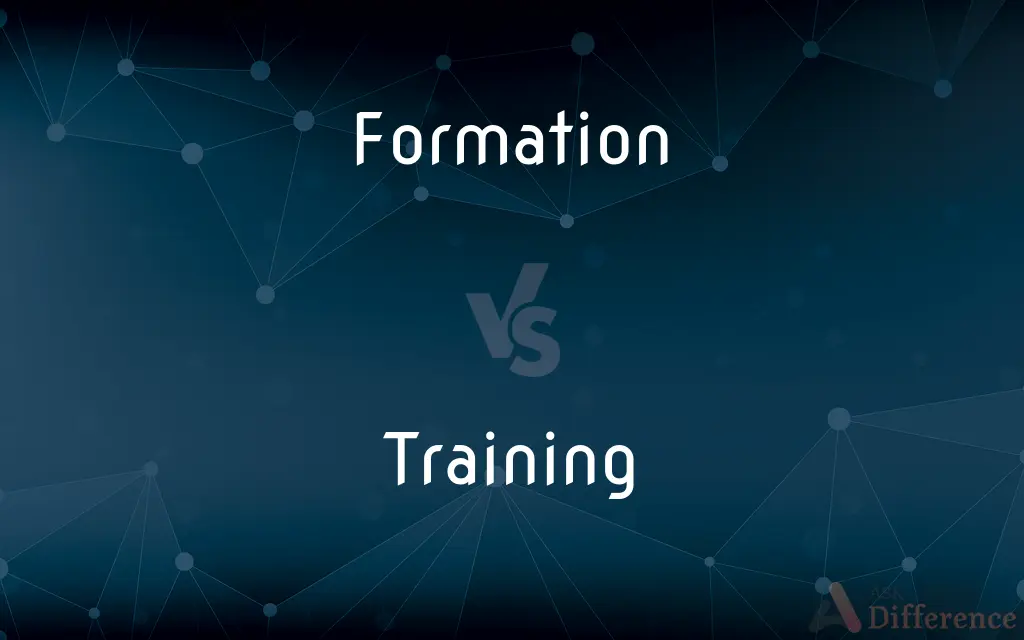Formation vs. Training — What's the Difference?
By Tayyaba Rehman & Fiza Rafique — Updated on March 6, 2024
Formation is the process of structuring and organizing, often referring to the development of personal or collective identity. Training focuses on skill and knowledge enhancement for specific tasks or roles.

Difference Between Formation and Training
Table of Contents
ADVERTISEMENT
Key Differences
Formation involves the development and structuring of personal or organizational identities and values, shaping individuals or groups according to certain principles or goals. Whereas, training is a more targeted approach aimed at enhancing specific skills or knowledge to improve performance in particular tasks or professions.
In the context of personal development, formation can refer to the shaping of character and ethical values over time, influenced by education, experiences, and social interactions. On the other hand, training often refers to the acquisition of practical skills or knowledge through exercises, instruction, and practice, with a clear objective of improving competency in a specific area.
Formation is generally a broader, more holistic process that encompasses not only professional development but also personal growth, focusing on values, beliefs, and attitudes. Training, however, is more narrowly focused on achieving proficiency or expertise in specific skills or fields, such as technical abilities, physical fitness, or job-related competencies.
Organizations may engage in formation to build a strong corporate culture or identity, aligning employees with the organization’s values and mission. Conversely, training programs within organizations are typically designed to increase efficiency, productivity, and quality of work, focusing on the technical or professional development of employees.
While formation is often seen as a continuous, lifelong process that evolves with personal experiences and changing environments, training is usually more structured and time-bound, with specific goals and outcomes in mind, such as learning a new software, language, or technique.
ADVERTISEMENT
Comparison Chart
Focus
Broad development of identity, values, and ethics.
Specific skill and knowledge enhancement.
Scope
Holistic, encompassing personal and professional growth.
Targeted, often limited to professional or technical skills.
Objective
To shape character, beliefs, and organizational culture.
To improve performance and proficiency in specific tasks.
Process
Continuous and evolving with experiences.
Structured and time-bound with clear objectives.
Context
Can be personal, organizational, or societal.
Primarily professional, vocational, or educational.
Compare with Definitions
Formation
The natural development of geological features.
The formation of the Grand Canyon was influenced by erosion over millions of years.
Training
Preparing athletes for competitions through physical exercise.
Rigorous training is essential for success in professional sports.
Formation
Structuring an organization’s culture and identity.
Corporate retreats can be important for team formation and strengthening corporate identity.
Training
Education that develops specific vocational skills.
Vocational training prepares students for careers in trades.
Formation
Establishing a structured arrangement or pattern in a group.
Military formation involves arranging personnel in a specific order for operations.
Training
Enhancing skills for specific tasks or jobs.
Her training in graphic design significantly improved her portfolio.
Formation
The process of developing personal character and values.
Early childhood education plays a crucial role in the formation of moral values.
Training
Conducting workshops to improve professional skills.
The company offers training sessions on new software tools annually.
Formation
The conceptual development of ideas or theories.
The formation of his philosophical viewpoint was influenced by various thinkers.
Training
Orientation programs for new employees.
The orientation training helps new hires understand company policies and procedures.
Formation
The act or process of forming something or of taking form.
Training
Training is teaching, or developing in oneself or others, any skills and knowledge or fitness that relate to specific useful competencies. Training has specific goals of improving one's capability, capacity, productivity and performance.
Formation
Something formed
Beautiful cloud formations.
Training
The process or routine of one who trains.
Formation
The manner or style in which something is formed; structure
The distinctive formation of the human eye.
Training
The state of being trained.
Formation
A specified arrangement or deployment, as of aircraft, troops, or players on a sports team.
Training
Present participle of train
Formation
(Geology) A primary unit in the mapping of rock strata, consisting of a set of contemporaneous rocks having the same characteristics and origin.
Training
Action of the verb to train. en
Formation
The act of assembling a group or structure. 14
Training
The activity of imparting and acquiring skills.
Formation
Something possessing structure or form. 17
Training
The result of good social upbringing.
Formation
The process during which something comes into being and gains its characteristics. 18
Training
(computing) The process by which two modems determine which protocol and speed to use; handshaking.
Formation
(military) A grouping of military units or smaller formations under a command, such as a brigade, division, wing, etc. 18
Training
(voice recognition) The recording of multiple samples of a user's voice to aid pattern recognition.
Formation
(geology) A layer of rock of common origin. 19
Training
The act of one who trains; the act or process of exercising, disciplining, etc.; education.
Formation
(military) An arrangement of moving troops, ships, or aircraft, such as a wedge, line abreast, or echelon. Often "in formation".
Training
Activity leading to skilled behavior
Formation
(sports) An arrangement of players designed to facilitate certain plays.
Training
The result of good upbringing (especially knowledge of correct social behavior);
A woman of breeding and refinement
Formation
The process of influencing or guiding a person to a deeper understanding of a particular vocation.
Formation
(category theory) A structure made of two categories, two functors from the first to the second category, and a transformation from one of the functors to the other.
Formation
The act of giving form or shape to anything; a forming; a shaping.
Formation
The manner in which a thing is formed; structure; construction; conformation; form; as, the peculiar formation of the heart.
Formation
A substance formed or deposited.
Formation
Mineral deposits and rock masses designated with reference to their origin; as, the siliceous formation about geysers; alluvial formations; marine formations.
Formation
The arrangement of a body of troops, as in a square, column, etc.
Formation
An arrangement of people or things acting as a unit;
A defensive formation
A formation of planes
Formation
A particular spatial arrangement
Formation
The fabrication of something in a particular shape
Formation
The act of forming something;
The constitution of a PTA group last year
It was the establishment of his reputation
He still remembers the organization of the club
Formation
(geology) the geological features of the earth
Formation
Natural process that causes something to form;
The formation of gas in the intestine
The formation of crystals
The formation of pseudopods
Formation
Creation by mental activity;
The formation of sentences
The formation of memories
Common Curiosities
What is training?
Training refers to the process of acquiring specific skills or knowledge through practice and instruction, aimed at improving performance in certain tasks or roles.
How do formation and training differ in their objectives?
Formation aims to shape character and values, focusing on broad development, while training targets the enhancement of specific skills for improved task performance.
Can formation and training occur simultaneously?
Yes, formation and training can occur simultaneously, especially in contexts where personal growth and skill development are both priorities, such as in educational institutions or certain professions.
What is formation?
Formation is the process of shaping and developing personal or collective identities, values, and ethical standards, often over a long period.
Can anyone undergo training for any skill?
In principle, yes, but the effectiveness of training can depend on the individual's aptitudes, prior knowledge, and the quality of the training program.
Are there specific methods used in formation?
Formation methods can include education, mentorship, reflective practices, and experiences that influence one’s values and character, often tailored to the individual or organizational context.
Is formation limited to personal development?
No, formation can also refer to the development of organizational culture or societal values, not just individual personal growth.
How long does training typically last?
Training duration can vary widely, from short workshops or seminars to longer, ongoing professional development programs, depending on the objectives and the skills being taught.
Is training only relevant for new skills?
While training is often associated with acquiring new skills, it can also be used to update or refresh existing skills, especially as technologies or methodologies evolve.
How does formation impact an organization?
Formation can significantly impact an organization by creating a strong, cohesive culture that aligns with its values and goals, influencing both employee behavior and organizational success.
Share Your Discovery

Previous Comparison
Alias vs. Pseudonym
Next Comparison
Microcredit vs. MicrofinanceAuthor Spotlight
Written by
Tayyaba RehmanTayyaba Rehman is a distinguished writer, currently serving as a primary contributor to askdifference.com. As a researcher in semantics and etymology, Tayyaba's passion for the complexity of languages and their distinctions has found a perfect home on the platform. Tayyaba delves into the intricacies of language, distinguishing between commonly confused words and phrases, thereby providing clarity for readers worldwide.
Co-written by
Fiza RafiqueFiza Rafique is a skilled content writer at AskDifference.com, where she meticulously refines and enhances written pieces. Drawing from her vast editorial expertise, Fiza ensures clarity, accuracy, and precision in every article. Passionate about language, she continually seeks to elevate the quality of content for readers worldwide.
















































